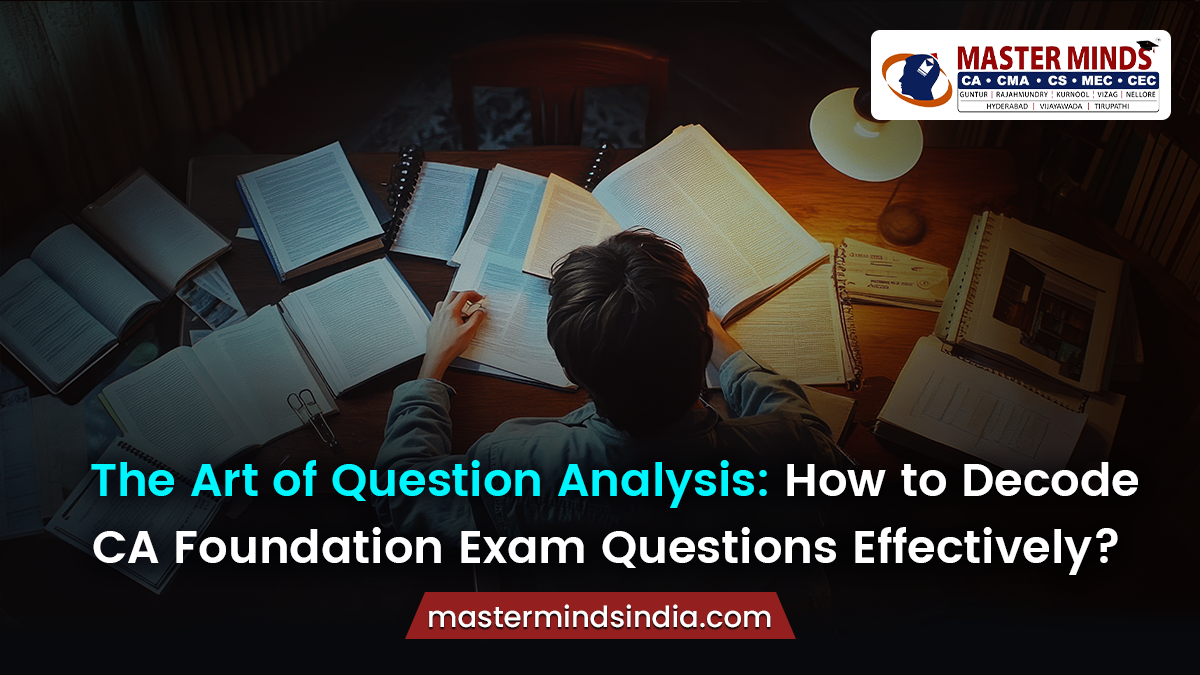Blog
The Art of Question Analysis: How to Decode CA Foundation Exam Questions Effectively?

Cracking the CA Foundation exam isn’t just about knowing the answers it’s about understanding the questions. Think about it: how many marks slip through your fingers simply because the question wasn’t analyzed correctly? Research shows that students who actively break down questions improve their accuracy by nearly 30%! That’s the difference between barely passing and scoring big.
But here’s the challenge: exam questions are often designed to test not just what you know, but how well you can apply that knowledge under pressure. Decoding these questions effectively is a skill an art, even that can transform your performance.
In this blog, we’ll dive into actionable strategies to master the art of question analysis. You’ll learn how to identify key requirements, avoid common traps, and approach each question with clarity and precision. Let’s turn exam-day confusion into confidence—one question at a time!
The Importance of Question Analysis
Effective question analysis is crucial for:
- Understanding Expectations: It helps you grasp what the examiner is asking and what is required in your answer.
- Managing Time: Proper analysis ensures you spend the right amount of time on each question, avoiding pitfalls like spending too long on complex questions.
- Improving Accuracy: It reduces the chances of misinterpreting questions and ensures that you address all parts of the question.
Decoding the Question
Begin by dissecting the question into manageable components:
- Identify the Keywords: Highlight keywords and phrases that indicate what is being asked. For example, words like “analyze,” “discuss,” or “explain” have specific implications for your answer.
- Analyze: This requires breaking down the topic into components and examining them.
- Discuss: Involves presenting both sides of an argument or issue.
- Explain: This means providing a clear and detailed description or clarification.
- Understand the Directive: Each question may come with specific instructions or a directive that guides your response. Ensure you understand whether you need to provide a detailed explanation, a concise summary, or a critical evaluation.
Breaking Down Complex Questions
Complex questions often include multiple parts or require detailed responses. Here’s how to approach them:
- Segment the Question: Break the question into its core components. For instance, if a question asks you to “Evaluate the impact of XYZ on ABC and suggest improvements,” divide it into:
- Evaluation of impact.
- Suggestions for improvements.
- Outline Your Response: Create a rough outline or plan for your answer based on the segmented components. This will help you stay organized and ensure you cover all aspects of the question.
Identifying Key Areas to Address
Focus on the critical elements that need to be included in your response:
- Scope and Limitations: Understand the scope of the question. Determine whether it is focused on a particular aspect or requires a broader discussion.
- Relevant Concepts: Identify the key concepts, theories, or formulas relevant to the question. Make sure you incorporate them effectively in your answer.
- Evidence and Examples: Use evidence, case studies, or examples to support your points. This not only strengthens your answer but also demonstrates a deeper understanding of the topic.
Time Management and Prioritization
Effective question analysis is closely linked to time management:
- Allocate Time Wisely: Based on the complexity and marks assigned to each question, allocate your time accordingly. For example, spend more time on questions that carry higher marks or are more complex.
- Prioritize Questions: Start with questions that you find easier or more familiar. This approach boosts your confidence and ensures you secure marks early on.
You Can Also Read:
- CA Intermediate New Study Material
- CA Course Duration After 10th, 12th & Graduation
- Tips to Crack CA in First Attempt
- Time-Saving Calculator Tricks for CA Foundation Students
- How to become a CA?
- CA Foundation New Syllabus
- CA Inter New Syllabus
- ICAI CA New Scheme
Common Pitfalls to Avoid
Be aware of common mistakes in question analysis and avoid them:
- Misinterpreting the Question: Ensure you fully understand what is being asked before starting your answer. Misinterpreting can lead to irrelevant or incorrect responses.
- Ignoring Key Parts: Address all components of the question. Missing out on parts can result in lost marks.
- Overcomplicating Responses: Keep your answers clear and concise. Avoid overloading your response with unnecessary details.
Practice Makes Perfect
Regular practice is essential for mastering question analysis:
- Mock Tests: Take regular mock tests to practice analyzing and answering questions under exam conditions. Review your answers to identify areas for improvement.
- Previous Papers: Work through previous exam papers to familiarize yourself with question patterns and common types of questions.
- Feedback and Improvement: Seek feedback on your practice answers and use it to refine your approach and improve your analysis skills.
Leveraging Resources and Tools
Utilize available resources to enhance your question analysis skills:
- Study Guides and Resources: Use study guides and textbooks that provide insights into common question types and effective strategies for answering them.
- Online Forums and Study Groups: Engage with online forums and study groups to discuss question analysis techniques and gain new perspectives.
- Professional Guidance: Consider seeking advice from mentors or instructors who can offer tailored guidance on effective question analysis.
CA & CMA Online Classes:

